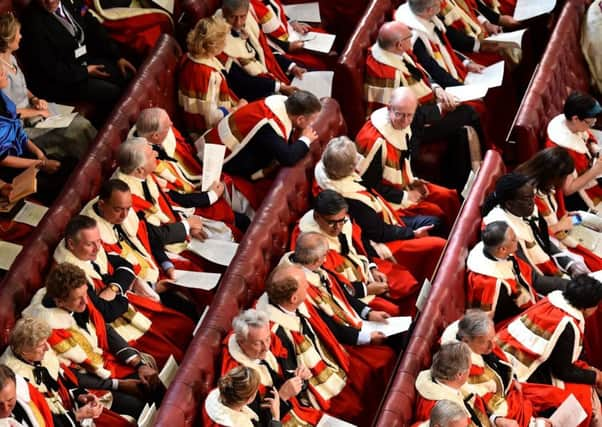Tory peer in Lords attempt to secure Northern Ireland gay pardons


The bid to overturn judicial findings prior to the 1982 decriminalisation of homosexuality is being spearheaded by Lord Lexden and could lead to Stormont being asked to vote on the matter, something which campaigners say would be the first time that Stormont has had to vote on gay rights legislation.
The Conservative peer, who has strong links to Northern Ireland, has tabled a series of amendments to the Government’s Policing and Crime Bill which would see posthumous pardons for convictions involving what had been many homosexual offences.
Advertisement
Hide AdAdvertisement
Hide AdJeffrey Dudgeon, the man whose Strasbourg court challenge led to homosexuality being made lawful in Northern Ireland, welcomed the development.
However, TUV leader and veteran QC Jim Allister has suggested that any such attempt to overturn the convictions could be unlawful under Northern Ireland’s specific Belfast Agreement-based equality law.
The North Antrim MLA told the News Letter that because Section 75 of the Northern Ireland Act outlaws discrimination on the grounds of sexual orientation, a pardon which was defined by the issue of sexuality could be unlawful – even though those equality laws were intened to protect the rights of gay people.
The DUP is still considering its position on the issue but Mr Allister said that he opposed retrospective pardons.
Advertisement
Hide AdAdvertisement
Hide AdLord Lexden’s amendments are supported by Labour peer Lord Cashman, the former Eastenders actor and founder of gay rights charity Stonewall.
One of the amendments states: “A person who has been convicted of, or cautioned for, an offence ... and who has died before this section comes into force is pardoned for the offence if two conditions are met.
“Those conditions are that – (a) the other person involved in the conduct constituting the offence consented to it and was aged 16 or over, and (b) any such conduct at the time this section comes into force would not be an offence under section 75 of the Sexual Offences (Northern Ireland) Order 2008 (sexual activity in a public lavatory).”
The amendment would issue retrospective pardons for those convicted under a range of laws, including the 1885 law prohibiting “gross indecency between men” and the 1861 legislation outlawing buggery.
Advertisement
Hide AdAdvertisement
Hide AdThe amendments, which are expected to be debated in the House of Lords in coming weeks, would also apply to those convicted under various military discipline laws which outlawed homosexual activity.
However, Lord Lexden’s proposals would explicitly rule out compensation for those convicted under the old laws, by stating that a pardon does not “give rise to any right, entitlement or liability”.
Last month, the Government announced that gay and bisexual men convicted of now-abolished sexual offences in England and Wales would get posthumous pardons.
The Scottish government followed that by announcing that it would separately legislate to undertake a similar scheme in Scotland.
Advertisement
Hide AdAdvertisement
Hide AdIt is likely that Westminster will be loath to legislate for a devolved matter unless Stormont explicitly agrees to it doing so. If Lord Lexden’s amendments do receive support, that could mean Westminster asking Stormont to pass a legislative consent motion to formally accept Westminster legislating on its behalf for something which is a devolved matter.
Last week, in response to a question from Alliance leader Naomi Long, the Justice Minister, Claire Sugden, said that Westminster’s legislation only applied to England and Wales, meaning that “a change to the law in Northern Ireland would therefore require Assembly legislation”. She added: “I am happy to consider this policy issue.”
Although at the time of the decriminalising of homosexuality in Northern Ireland, the DUP was still running the ‘Save Ulster From Sodomy’ campaign, the party has not ruled out supporting retrospective pardons for those convicted under the old law.
The DUP highlighted that its MPs had supported the Parliamentary campaign to grant a pardon to Alan Turing and said it would “examine any proposal to offer such pardons locally within Northern Ireland”.
Advertisement
Hide AdAdvertisement
Hide AdThe party added: “We recognise the historical hurt that such convictions impose on many gay and bisexual men.”
Mr Dudgeon, who is now an Ulster Unionist councillor in Belfast, has written to the Justice Secretary, Liz Truss, urging the Government to either support the amendments or bring forward similar proposals of its own. He argued that doing so would be “the most efficient way of ensuring that the legislation extends to Northern Ireland”.
Mr Dudgeon told the News Letter that a Stormont vote on the matter would be significant because “no gay law reform has gone through Stormont”.